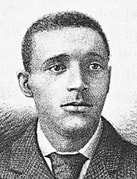 James A. Bland (1854-1911) James A. Bland (1854-1911) Oh, Dem Golden Slippers is an old song from 1879 about going to heaven and wearing fancy footwear. It was composed in by James A. Bland, who was one of the first African-American musical superstars. He was a hit songwriter as well as banjo playing/singing minstrel performer. He toured all over the USA and went on a successful tour of Europe. His biggest hits were Carry Me Back to Ol’ Virginny and Oh, Dem Golden Slippers. Oh, Dem Golden Slippers is loosely based on a real Negro Spiritual called Golden Slippers. Very loosely based. You may hear some similarities between the two songs, but only if you squint with your ears. Below is the spiritual Golden Slippers, the song that Oh, Dem Golden Slippers is loosely based on: 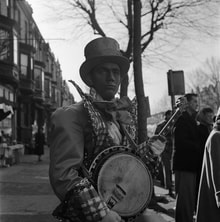 A Fine Young Mummer A Fine Young Mummer Now, let’s get back to James A. Bland’s Oh, Dem Golden Slippers, which is what I play. This song was wildly popular in the late 1800s and early 1900s. When the Philadelphia Mummers Parade got started in the early 1900s, Oh, Dem Golden Slippers was adopted as the unofficial theme song, and it’s still played today. Fats Waller made a wonderful recording of Oh, Dem Golden Slippers in 1939. His improvised vocals are brilliant. He sings phrases that makes sense and are funny, as opposed to scatting nonsense syllables. Its one thing to be able to say something funny, but its another to sing it on the fly. Quite a skill! Fats sounds like an old time Harlem Baptist preacher (which was his father’s occupation, by the way). He riffs on the sermon, referring to “fine Arabian golden slippers,” and saying other funny things. And then Fats departs from the original melody and chord progression entirely and just does his own thing. It’s fantastic. Check it out: I love Waller’s version so much I just had to figure out what he was doing. So I did. I can’t hold a candle to his singing, but I can more or less imitate his piano playing. I took the notes that he sings and I play them on the piano. Kind of like how Liszt used to take Schubert songs originally for vocals and piano, and he arranged them to be performed as solo piano pieces (yeah, I just compared myself to Liszt). Here is my instrumental version of Fats’ vocal version of the song:
0 Comments
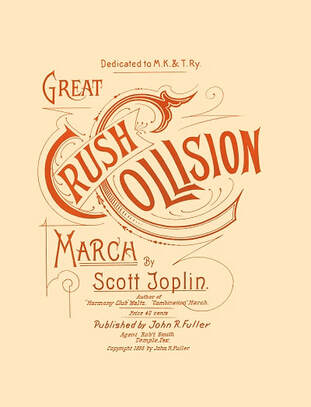 In my opinion, Scott Joplin's most underrated work is The Great Crush Collision March (1896). It is exciting, it is joyous, and it is funny. Scott Joplin is said to have been a serious man who seldom laughed. His magnum opus, Treemonisha, is drama, not comedy. But I believe that Joplin had a funny side. The turn-of-the century Maple Leaf Club circulated a business card that listed several members of the club, and Joplin is described as the entertainer. The entertainer! As in his composition, The Entertainer. Was Joplin the entertainer of The Entertainer? I think he was. Joplin’s presence at the piano made people smile. Joplin could even make people laugh. I believe this because I’ve played The Great Crush Collision March. The Great Crush Collision March was inspired by a wild publicity stunt in which the MK&T railroad company crashed two trains together at full speed in an open field in Texas. It would be named the "Crush Collision” in honor of William Crush, the MK&T employee who cooked up this whole cockamamie scheme. The collision was open to the general public and 40,000 people showed up (that’s enough people to fill up Wrigley Field). There was food, music, and festivities. This was basically the ragtime equivalent of Woodstock or Burning Man. But when the trains finally crashed, the boilers exploded and shrapnel flew into the crowd, killing two. The MK&T's public relations team sprung into action and somehow, despite the wrongful deaths - the event was remembered fondly. The charm of trains colliding on purpose just won everybody over. Scott Joplin was living in Texas at the time of the Crush Collision. He was either at the event, or more likely, he just heard about it. Maybe he was truly inspired by trains colliding. Or maybe he wasn't, and someone else (the publisher perhaps) commissioned him to write a march related to the event. Or maybe Joplin's main motivation was simply to cash in on Crush Collision-mania. Whatever the reason, Joplin published The Great Crush Collision March in 1896, in Temple, Texas. The march starts off sounding ominous. It's in a minor key, and the bass slowly rises, crescendoing like a train slowly gaining momentum. It's the musical equivalent of "Start your engines!” I can picture 40,000 titillated Texans holding on to all 10 gallons of their hats. The next three strains of the march are pure happiness and joy. There is a delightful call and answer between the right and left hands. This music would be well served by a high-stepping marching band. I can picture the drum major with his staff and feathery helmet. To me, Joplin is saying “Two trains are going to crash! Let us join together and party like it’s 1899!” When we get to the final section, it starts sounding ominous again. We hear train #1 rumble down the track. We hear its whistle. Then we hear train #2. Then its whistle. Then CRASH!!! Then silence. The smoke clears and the whole train crash section repeats! Let us bask in the triumph of the Crush Collision, not once, but TWICE! When the piece finally ends, its tempting to take the repeat once more and crash those trains a third time. If you do not laugh or smile at Joplin's train crash, then you are a dull individual and are no fun at parties. Joplin, on the other hand, was probably the life of the party. He was literally the entertainer! He went on to more serious pursuits in life, like opera, and maybe he became crankier as he got older and sicker (who doesn’t?). But in 1896, he had a sense of humor and I bet he was fun to hang out with. Below is my rendition of The Great Crush Collision March. When the trains crash the first time, I stick to the score. For the second crash, I try to make the crash even crashier. Here’s my rendition of one of the top ballads of all-time, Jerome Kern’s Smoke Gets in Your Eyes (1933): 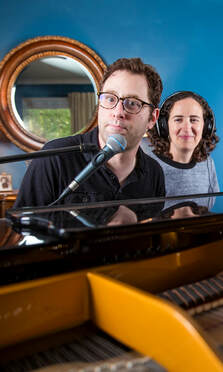 The couple that podcasts together, stays together? So far so good. The couple that podcasts together, stays together? So far so good. For many people, Smoke Gets in Your Eyes is remembered as a 1958 hit by the Platters. Others associate it with the classic Nat King Cole recording. For others, Benny Goodman, for others Frank Sinatra, for others, etc etc etc. Everybody and their mother had a hit recording with this tune, except for me (but I’m working on it). Smoke Gets in Your Eyes is a special song for me because I associate it with my wife, Kate. She works in the field of public health, and one of her former positions was Tobacco Control Coordinator for the county health department. Needless to say, the Uslan household has a strict no smoking policy. When we relax after dinner, we use chewing tobacco only! (That was a joke.) Here’s some more information about Kate that you might not be aware of. She is very musical. In elementary school, her music teacher told the class that boys should consider learning drums, and girls should consider the dainty instruments, like flute. So Kate of course chose drums and made it her mission to beat out all the boys to become first percussion chair in the middle school band. And she succeeded! She also became very skilled at the marimba. But as she devoted herself to public health, she went on marimba hiatus. When we got married and needed to scrounge up some dough, we sold the marimba. Now I think it would be nice if she takes it back up again. So if you have an extra marimba you want to get rid of, please contact me privately. |
Ethan UslanMusic, stories and thoughts from an old-time piano player. Archives
May 2023
Categories |
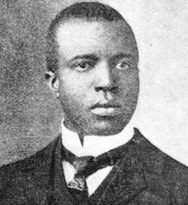
 RSS Feed
RSS Feed